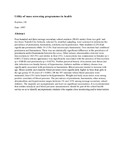| dc.description.abstract | Four hundred and three teenage secondary school students (50.6% males) from two girls' and two boys' Nairobi City Schools, selected by stratified sampling, were screened to determine the prevalence of proteinuria, haematuria, nitrituria and hypertension. Nine students (2.2%) had significant proteinuria while 14 (3.5%) had microscopic haematuria. Two students had combined proteinuria and haematuria. There was no statistically significant difference in the prevalence of proteinuria and/or haematuria between the sexes. Other urinary abnormalities detected were leucocyturia in 14(3.5%) and nitrites in four (1%). Leucocyturia was commonner in females (p = 0.001). Cloudy urinary appearance was significantly associated with the presence of leucocyturia (p = 0.0028) and proteinuria (p = 0.0276). Neither personal history of recurrent sore throat and skin infections nor family history of hypertension, diabetes mellitus or kidney disease was significantly associated with proteinuria or haematuria. Blood pressure tended to increase with age. Mean systolic and diastolic blood pressures were significantly higher in boys than girls in the age group 15-18 years (P < 0.001). Of the 397 students whose blood pressures were measured, four (1%) were found to be hypertensive. Weight and body mass index were strong positive correlates of blood pressure. The prevalence of proteinuria, haematuria, other urinary abnormalities and hypertension ranges between 1% and 3.5% among teenage secondary school children. The majority are asymptomatic and have no significant associations. It is recommended that routine urinalysis and blood pressure measurements should be part of the school health service so as to identify asymptomatic students who require close monitoring and/or intervention | en |

